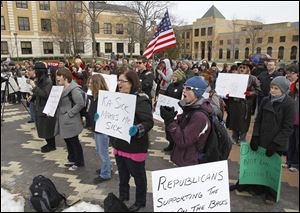
BGSU officials linked to role in SB 5 draft
9/22/2011
Protesters demonstrate against Ohio Senate Bill 5 on the Bowling Green State University campus in Bowling Green in this March 3, 2011, file photo.
Officials of Bowling Green State University played a leading part in writing the section of Senate Bill 5 that bars university professors from collective bargaining, letters and emails exchanged between officials earlier this year and obtained by The Blade appear to show.
The university's zeal to exclude professors from collective-bargaining eligibility in Ohio came about half a year after the faculty at BGSU voted to be represented in bargaining by the American Association of University Professors union, over the opposition of the college administration.
"It appears that the BGSU administration, scorned by the faculty's success in forming a union, decided that it would get rid of its 'problem' by eliminating collective bargaining rights for all professors across the state of Ohio," Sara Kilpatrick, executive director of the AAUP of Ohio, said.
The correspondence covers the period from January through March, when S.B. 5 was being drafted behind closed doors to when it was enacted by the Republican-controlled General Assembly.
The bill, which curtails public employees' rights to bargain in Ohio, is on hold pending a referendum set for Nov. 8. If enacted it would abolish the right to bargain for professors who participate in policy decision-making such as in recommending colleagues for promotion, selecting textbooks, and approving course content. Professors in state universities typically take part in faculty senates and in department committees that shape academic policy.
Former BGSU President Carol Cartwright wrote to newly installed Gov. John Kasich on Jan. 19 urging, among other things, that the university be exempted from the 1983 collective-bargaining law.
An email appears to show that Sean FitzGerald, BGSU's general counsel, came up with the language for the section of S.B. 5 that identifies professors as management employees. A Feb. 25 email from the Inter-University council's vice president of government relations, Mike Suver, attributes the amendment to Mr. FitzGerald.
"Here's what we submitted to [state Sen. Kevin] Bacon's office," Mr. Suver wrote, referring to the Columbus Republican who headed the committee that approved the bill. "We used Sean's language."
Mr. FitzGerald acknowledged that he suggested adopting the standard based on a 1980 U.S. Supreme Court case known as NLRB vs. Yeshiva, but he said the exemption was widely known.
"The way it came about is there were discussions on a broad range of issues about university regulation and rules that apply to universities. I guess I would really describe it more as a brainstorming thing and I put that out there as an idea that the Yeshiva University case ought to be considered as applying in Ohio, and from there others ran with it," Mr. FitzGerald said. He said others would have made the same suggestion if he hadn't.
He said to suggest that the university's aggressive effort to repeal collective bargaining was retaliation for the BGSU's vote in October for union representation was a "harsh" accusation.
"I don't agree with that," Mr. FitzGerald said.
Bruce Johnson, president and chief executive officer of the Inter-University Council, which represents 14 public university presidents, disagreed that Mr. FitzGerald was the first or the only one to think of applying the Yeshiva policy -- which exempts private college and university faculty from collective bargaining -- to the Ohio law. He said it was "common sense" to university officials, who are well aware that private colleges and universities are exempted under federal law from collective bargaining under the Yeshiva ruling.
Adopted earlier this year by the Republican-controlled General Assembly and signed by Gov. John Kasich, the law restricts the collective-bargaining rights of public employee unions, including police officers, firefighters, and teachers. The law also defines professors who have a role in policy-making as "management-level employees," and not eligible to bargain collectively.
David Jackson, an associate professor of political science and president of the AAUP chapter at BGSU, said the revelation of BGSU's leading role was "disappointing."
He said the chapter rejects the idea that participating in decisions such as selecting textbooks and deciding on the content of courses makes them administrators.
"We're not setting our salary, we're not deciding our health-care package, the big things unions negotiate for," Mr. Jackson said.
He said if the new president truly wants a better relationship with the faculty, as President Mary Ellen Mazey has said, she should voluntarily recognize the AAUP as the employees' representative in collective bargaining. Whether that would be allowed under the law is not yet known.
President Mazey said in a statement provided to The Blade that she could not comment on the university's past position.
"What I can tell you is that I came to Bowling Green with the understanding that our faculty had formed a union. My experience at unionized institutions and with faculty negotiations was one of the reasons the BGSU Board of Trustees selected me," Ms. Mazey said. "One of the top priorities of my administration is to negotiate the first contract with our faculty and we have begun that process. We are moving forward under the current law."
Contact Tom Troy at tomtroy@theblade.com or 419-724-6058.